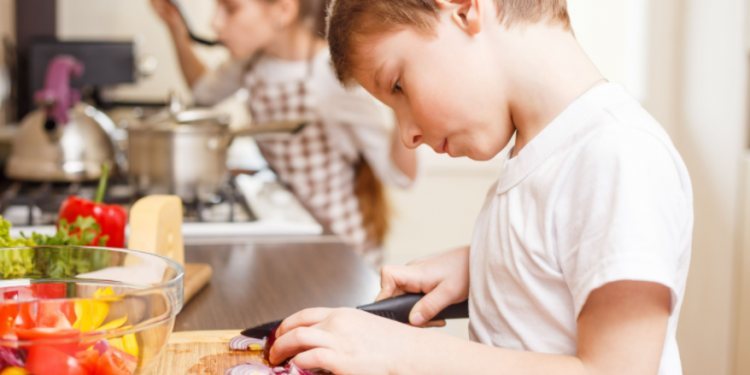By Ian Hebeisen
At the beginning of this year, I moved out of my parents’ house and into an apartment in Minneapolis. Soon, I learned the true headache of cooking your own meals.
Cooking is such an involved process, isn’t it? You need to gather the ingredients, slice and peel the appropriate items, and grab an insane number of utensils you’ll only need to wash later on. And, only after all that prep work, can you actually begin to cook and combine the food to create a legitimate meal. Challenging enough on its own, mustering the strength and brain power to complete the task after a long day of work absolutely drains you.
My mom never really enjoyed meal preparation, but after her traumatic brain injury, the task grew from annoying to detrimental. Every ingredient, measuring spoon, and spatula lives in its own little space in the kitchen, and taking the time to hunt down everything proved an exhausting task on its own, let alone cooking a fully balanced meal for five.
From my observations, a couple of key changes made cooking so much more difficult. The first is brain fog; the second is nerve damage.
When cooking, yo often juggle multiple tasks at once. You might be whisking one thing while slicing another, all while stirring a sauce on the stovetop. It’s easy to get overloaded and the brain fog to roll in, and my mom often needs to concentrate on one task at a time.
As far as nerve damage, cooking involves lots of meticulous manipulation of the fingers. You do everything with your hands: peeling onions, chopping parsley, cracking eggs, and so on. Each requires some level of finger dexterity, grip strength, and repeated arm movement. Sometimes when my mom does an intricate task like that, her nerves will flare up, causing her arms and legs to contract and contort painfully.
Even the kinds of foods my mom could eat changed. She always expressed a sensitivity to nitrates and certain preservatives, but after her car accident, she began developing allergies to peanuts, coconuts, and other nuts. Now, the only nuts she can eat without her throat swelling are sunflower seeds and pine nuts.
Needless to say, we all needed to adapt quite a lot. Cooking became even more of a group effort, sometimes with each of us planning and executing a different meal per week. Prepping food for the upcoming days beforehand became a routine Sunday activity: if my mom had meals ready to go for her lunch and dinner, she could save a lot of brain power and fight off unwelcome fatigue.
Now, batch cooking serves as a mini-family tradition. W gather at my mom’s house, usually with a recipe we want to try. As one big unit, we divide and conquer the kitchen. Some of us are in charge of chopping, while someone else cracks eggs and measures ingredients, and another is in charge of dishes. We also read the recipes: the small print and random abbreviations confuse my mom and can lead to unnecessary headaches.
While prepping her own lunch for work proves challenging, having meals in storage containers she can grab on her way out the door makes her day much easier. In the evening, dinner is already prepared, waiting for someone to pop in the microwave – an instant home-cooked meal.
Throughout these endeavors, another lesson occurred to me. When helping my mom cook, it’s better to focus on the things that she can do instead of the things she cannot. Being optimistic lightens the mood and creates a generally more positive experience when you look at the possibilities and pluses versus the obstacles.
This applies to every aspect of caretaking and adapting to a brain injury. Taking a step back and evaluating what’s going right will help you see how far you’ve come.
Ian Hebeisen graduated from Saint Mary’s University in May 2020, earning a degree in Literature with a Writing Emphasis. Now living in the Twin Cities, Ian writes comics, graphic novels, and poetry. In his spare time, he enjoys playing board games with his family.











